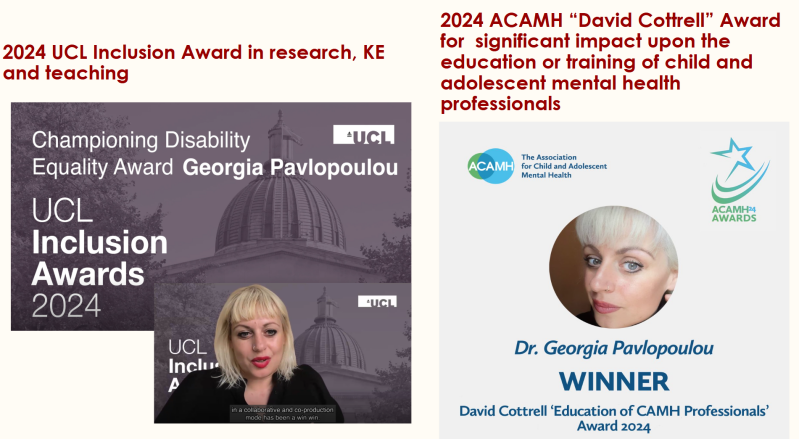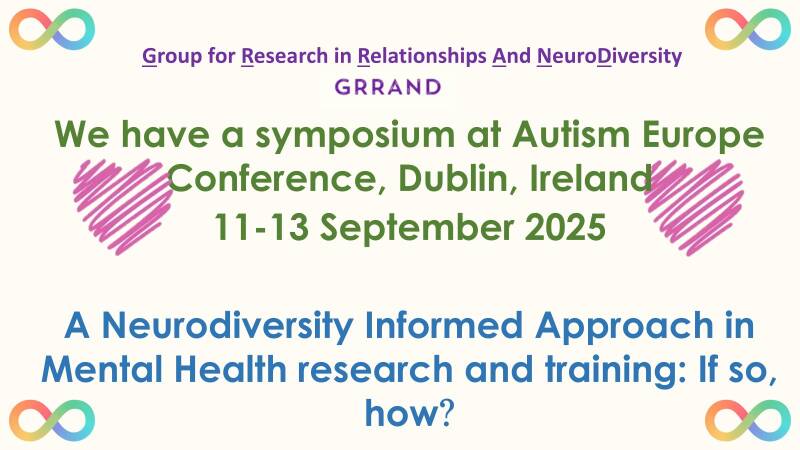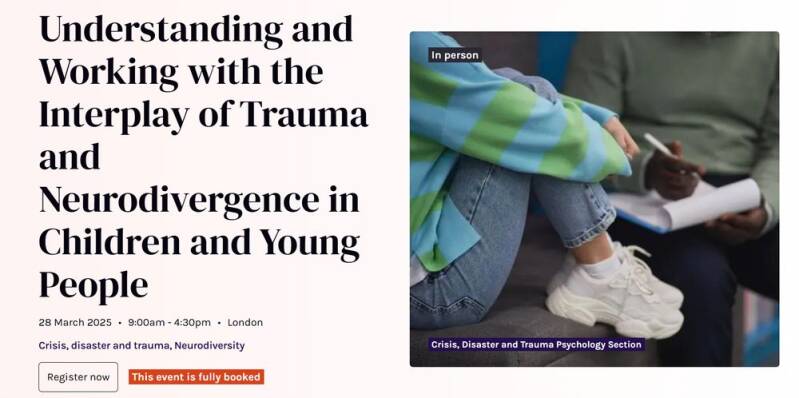🎉 Congratulations to Dr. Georgia Pavlopoulou! 🎉
We’re thrilled to celebrate Dr. Pavlopoulou as the winner of the 2024 David Cottrell ‘Education of CAMH Professionals’ Award from @acamh!
This recognition is a fantastic tribute to her inspirational leadership in the National Autism Trainer Programme (NATP), which has trained over 5,000 professionals in partnership with At-Autism and is now embedded within NHS priorities. 🧠💙
A well-deserved honour and a powerful way to mark her significant impact upon the education of child and adolescent mental health professionals.






We present below a brief overview of our achievements and media appearances and professional reports 2020-2021
{Last Updated: 1st of August 2021}
News / Activities
Discover top tips on reopening of schools for autistic students and families- IOE new policy brief (based on BERA funded research report)
Read more here: https://www.ucl.ac.uk/ioe/research-projects/2021/aug/experiences-autistic-young-people-and-their-parents-lockdown-and-reopening-schools
Scottish Government's policy document features our Lonely Lockdown report
Delighted to see the joint UCL Institute of Education and Sibs work we completed with fabulous Clare Kassa
to be included in recent policy documentation in Scotland, part of evidence summary published this summer
https://lnkd.in/dprDqDUf
Siblings matter. Good to see recognition on paper. Now we need to work further to see action, with and for siblings.
New project part of £24m investment into adolescent mental health
A new collaboration between UCL Institute of Education (IOE) GRRAND's Georgia Pavlopoulou, the Anna Freud Centre and King’s College London has been awarded £3.3 million funding to generate a whole new understanding of the developing mind of young people on the autistic spectrum and/or with ADHD.
Find out more here: https://www.ucl.ac.uk/ioe/news/2021/jul/new-project-part-ps24m-investment-adolescent-mental-health
Policy Exchange Webinar with Sibs Charity
Georgia Pavlopoulou and Clare Kassa gave talks and led discussions with policy makers and health, educational and social care professionals around implications of their latest report
New autism strategy: GRANND's reports influencing new autism policy 2021-2026
The UK government commissioned scientists at Care Policy and Evaluation Centre at the London School of Economics and Political Science in the Policy Innovation and Evaluation Research Unit (PIRU), PIRU report shaped the new autism strategy 2021-2026 that was published on the 21st of June- PIRU was published alongside the new strategy. PIRU report cited multiple times Pavlopoulou, Wood, Papadopoulos (2020) research report which has shown that the pandemic exacerbated many of the inequalities autistic CYP and their families already faced, like loneliness, anxiety and exclusion from public spaces, as well as creating new challenges.
Pavlopoulou et al (2020) research brief: https://discovery.ucl.ac.uk/id/eprint/10101297/
PIRU commissioned report to inform government plans: https://piru.ac.uk/assets/files/The_Impact_of_COVID-19_on_Autistic_People_in_the_United_Kingdom_Final_Report.pdf
Government’s New strategy: https://www.gov.uk/government/publications/national-strategy-for-autistic-children-young-people-and-adults-2021-to-2026
The strategy also included work Pavlopoulou completed in collaboration with CEO from Sibs charity Clare Kassa during the lockdown highlighting the need for respite time ( https://www.sibs.org.uk/wp-content/uploads/2020/07/Sibs-report-Life-in-Lockdown-2.pdf )
As a result, strategy recognises that renewed support for family members and carers is needed. Many were exhausted during lockdown, especially when external support and respite care were stopped or reduced. The autism strategy sets out how the Government plans to support autistic adults and children in England over the next five years.
Read the strategy here: https://www.gov.uk/government/publications/national-strategy-for-autistic-children-young-people-and-adults-2021-to-2026
New report commissioned by the British Educational Research Association (BERA) and IOE research policy briefing
The research project was conducted in late 2020 with 17 parents of autistic children and young people (CYP) attending mainstream schools in England, as well as six autistic CYP themselves. The aim of the research was to generate insight into these parents and children’s lived experiences of the 2020 lockdown, home-schooling, virtual learning and return to school. While much of the broader focus on impacts of lockdown on education has shown the effects on CYP experiencing socio-economic deprivation, this research demonstrates its significant impacts on autistic CYP, who were already at risk of educational exclusion pre-pandemic. The briefing provides evidence to contribute to current debates about how schools move forward in the wake of the pandemic.
Policy briefing: https://discovery.ucl.ac.uk/id/eprint/10131401/
Flow Unlocked collective at Scottish Autism Webinar
All things autism, relationships, creativity and collaborative practice.
See recording of our live webinar here: https://www.youtube.com/watch?v=c4y1k3IS9kQ
Train and Engage between UCL GRRAND researchers and East Londoner teachers, children and parents
We have been delighted to award our Wellbeing Youth Scientists and their teachers through GRRAND's knowledge exchange programme co-led by the Mayflower Primary School in East London and the UCL Institute of Education has involved children, teachers, parents and researchers in dialogues around school wellbeing.
The Year 5 children of the Mayflower Primary School, their teachers, Heba Al-Jayoosi (Assistant Head at Mayflower Primary School), Dr Georgia Pavlopoulou and Myrofora Kakoulidou worked together to co-decide and co-produce creative ways to reflect on children’s feelings and thoughts about school life. This knowledge exchange programme was supported by a public engagement bursary from UCL Culture.
Distance is nothing Our firm played on the big screen at Bloomsbury Theater, part of Out of Touch: Festival of Intimacy
Out of Touch: A Festival of Intimacy is a day-long festival of intimate performances, conversations and interactions that responds to the themes of touch and intimacy, and asks what intimacy has meant whilst living through the Covid19 pandemic. Contributing work will be created by artists, UCL students and academics, and the event will take place across UCL’s Bloomsbury Theatre, Grant Museum, Petrie Museum and a variety of outdoor spaces in between.
See film here: https://iris.ucl.ac.uk/iris/publication/1877146/1
Ground-breaking interdisciplinary research festival dispels the myths of autism inspired by GRRAND's Flow Unlocked
Our team was excited to co-organise IAR festival with Dr Anna Stenning and Dr Damian Milton “The IARF event was a huge success and has come about through much continuing effort within an ever-broadening neurodivergent culture. The quality and diversity of presentations and feelings of connection and solidarity for many participating, show the value of such events and sends a clear message to all those who claim their aims and practices are for the benefit of autistic people, yet all too often fall below that ideal.”
GRRAND member has won an Impact Fellowship Award
Join us in congratulating GRRAND researcher Georgia Pavlopoulou for receiving an IOE UCL Early Career Impact Fellowship Award and wishing her all kinds of new challenges and opportunities in her work with autistic adolescents, mental health and educational practitioners. Dr Pavlopoulou will collaborate with NHS Clinical Leads and Youth Co-production team to produce leaflets and video animations based on autistic adolescents' personal accounts.
Read more here: https://www.ucl.ac.uk/ioe/research/engagement-and-impact/training-and-events/ioe-early-career-impact-fellowship
Autistic Teen's Sleep: Advice and Guidance for Professional Practice Report. National Autistic Society
National Autistic Society has recently published a report based on our latest paper coproduced with autistic teens. Full report is available here: https://www.autism.org.uk/advice-and-guidance/professional-practice/teenagers-sleep
Artists and researchers join forces for public art planning: Biggest UK Art's Magazine feat. our #FlowUnlocked autistic collaborative
Artists Briony Campbell and Jon Adams are working with psychologist Dr Georgia Pavlopoulou to explore the importance of relationships within the autistic community, reflecting on the impact of distancing and mediated communications during the pandemic from this group’s experience. Together, they are tackling damaging stereotypes about autistic people and celebrating autistic narratives, part of UCL Trellis Knowledge Exchange Fundinging. contemporary artists, Read more here: https://www.artsprofessional.co.uk/magazine/article/artists-and-researchers-join-forces-public-art-planning
Our GRRAND team is part of the 6 cutting-edge academics and 95 east Londoners have united to create artworks in UCLTrellis opening this week. Book now for the programme of exciting free events, including film premieres and artists in conversation, at https://www.ucl.ac.uk/culture-online/trellis-festival
The first Interdisciplinary Autism Research Festival for creative approaches to mental health, research and public engagement #IARF
This festival, lead by Dr Anna Stenning in collaboration with Dr Georgia Pavlopoulou and Dr Damuan Milton will explore creative ethical and methodological approaches to autism research by focusing on insider experiences, social relationships and the arts. We will be working across neurological and disciplinary divides to explore what is missing from current conversations about autism and to improve mental health outcomes and social inclusion for autistic people and their families.
Speakers and audience members will work across neurological and disciplinary divides to explore what is missing from current conversations about autism and to improve mental health outcomes and social inclusion for autistic people and their families.
The festival is also aiming to address the barriers we face in communicating the relevance of embodied cognitive difference more generally. In this way, we intend to challenge the idea that there is one ‘central’ narrative that conveys the experience of autism.
Last but not least, the event aims to dispel the myths that autistic people are not interested in the arts or social relationships. The event will run online with a mixture of invited and open-call participants over three days – between 19 and 21 May 2021. Book you ticket here: https://www.eventbrite.co.uk/e/interdisciplinary-autism-research-festival-tickets-135122564227
We would like to see this as the first stage towards research events that are run by and for autistic people, and which celebrate the cultural contributions of our community. The festival is funded by Wellcome Trust and is part of Dr Anna Stenning's Fellowship on Nature, Culture, Arts and Autism at University of Leeds.
Autistic family mental health and Black Communities in the UK: New GRRAND research in collaboration with Lambeth NAS local branch and A2nd Voice
GRADD researcher Aramide Salami is working on a new project looking at the experiences, perspectives and needs of Black autistic young people and their family members. For more information please email: aramide.salami.15@ucl.ac.uk
GRRAND research accepted to be presented at the 20th Anniversary of INSAR in May 2021
The International Society for Autism Research (INSAR) is one of the largest scientific and professional organization devoted to advancing knowledge about autism. INSAR was formed in 2001 and is governed by an elected, volunteer Board of Directors who oversee all functions of the Society. Various committees assist the Board in carrying out the mission of the Society. This year, IOE Alumni Claire Usher is presenting her work with Dr Pavlopoulou and Dr Pearson titled "I Can Actually Do It without Any Help or Someone Watching over Me All the Time and Giving Me Constant Instruction...’ Autistic Adolescents’ Accounts of Using Video Game and Online Networking While Gaming". Their paper argues that online gaming experience provides a rich source of satisfaction for autistic teenagers. Video games provide an uncomplicated space to express themselves, connect with peers and a rich source of fulfilment from situations that are often not satisfied in their real world.
Find out more: https://insar.confex.com/insar/2021/speakercenter.cgi?username=80401&password=653327
Understanding the Narrative of Stigma and the Illusion of Choice
In their recent paper, Dr Pearson and Rose, conclude that work on masking needs to think about autistic people in a different way. "Autistic people grow up in a social world and experience a lot of negative views about autism and autistic people. We argue that we need to understand how this social world and the trauma that can come from being part of it contributes toward masking. We also argue against the idea that masking is a “female” thing that occurs as a result of there being a “female-specific” subtype of autism, because this might make it harder for some people to get a diagnosis (e.g., nonbinary people, and men and women who do not fit with any of the current criteria). Instead we argue that people need to recognize that autism does not look like one “type” of person, and try to separate ideas about masking from ideas about a person not fitting a stereotype."
Full paper can be accessed here: https://www.liebertpub.com/doi/full/10.1089/aut.2020.0043
The wellbeing of disabled children’s siblings severely impacted by lockdown
The research, by Sibs charity Chief Executive Clare Kassa with contributions by UCL Institute of Education (IOE) academic Dr Georgia Pavlopoulou, reveals 75% of parents think their sibling child’s mental health has worsened.
The study, which is the first to look at siblings’ experiences in the UK during the pandemic, noted that siblings are often an overlooked group of children in both school and wider communities for whom lockdown has had a tremendous impact on their health and wellbeing.
Having conducted a survey with 876 parents in May 2020, the team discovered that 50% of siblings are providing more care in lockdown. 1 in 3 siblings are also feeling isolated and missed support from family and friends in during lockdown.
Parents highlighted the lack of space and breaks for the siblings and the difficulties in managing their children’s different needs. One parent said: “Keeping up with typical activities and keeping one socialised whilst adapting the normal routines so drastically with another is very challenging.”
Covid must be catalyst for education opportunity
As we slowly emerge from lockdown and begin to transition back to a semblance of pre-Covid 19 society, it is now critical that we keep the spotlight on this agenda and resist placing the needs of autistic children at the bottom of what is becoming an increasingly growing national ‘To Do’ list, reports Gary Scott in The Herald News. The article features Dr Pavlopoulou's research in collaboration with by Dr Chris Papadopoulos from Bedfordshire’s Institute for Health Research, and Dr Rebecca Wood from University of East London outlined how the coronavirus lockdown impacted on families of autistic children and young people. t found, perhaps unsurprisingly, 70% of family carers reported a change to their daily routine. More importantly, it reported that 86% of parents of autistic children felt lack of government support during lockdown but with many stating they did not want a return to the pre-Covid world. This position is entirely understandable in light of the many issues and challenges autistic children and their families face including unlawful exclusion from school. Find the full article below;
https://www.heraldscotland.com/news/18614206.agenda-covid-must-catalyst-education-opportunity/
Shouting Above the Noise: Autistic Life Writing and the Interdisciplinary Autism Research Festival
Read a recent article written by Dr Anna Stenning, publishe in Medical Humanities magazine The Polyphony where she demonstrates how life writing by autistic authors contributes to medical and cultural framings of autism. Dr Stenning mentions Pavlopoulou's experience sensitive approach to autism research and the importance of relationships as a key determinant of mental health for autistic people . She also introduces the Interdisciplinary Autism Research Festival, which will take place in May 2021.
Media Appearances
Media Appearance: Share Autism Innovation magazine
Read our article, all things relationship, coproduction and mental health: https://www.scottishautism.org/about-autism/research-and-training/centre-practice-innovation/share-magazine/share-summer-2021/exploring-autistic-peoples-relationships-and-during
Media appearance: BBC Newsround featuring our new report on siblings' of disabled children's mental health and support needs
We are delighted to see BBC NewsRound covering our latest report on siblings' mental health. The article also contains a wonderful video with siblings' personal accounts of their lockdown experiences. Find out more here: https://www.bbc.co.uk/newsround/56663470
Media Appearance: An experience sensitive approach to sleep research and practice with autistic teens
US biggest autism science magazine shared Dr Pavlopoulou's recent paper reporting on research coproduced with autistic adolescents in their community newsletter.
Dr Pavlopoulou's open access paper { https://www.frontiersin.org/articles/10.3389/fpsyg.2020.583868/full } is rated on the top 5% of all research outputs scored by Altmetric.
Media Appearance: How autistic people and their families have experienced the lockdown? Live on BBC Radio 5 Live
Dr Georgia Pavlopoulou touches upon considerations concerning children with autism during the pandemic, such as retaining positive learning benefits when lockdown is lifted in conversation with reporters, parents of autistic people and autistic people on BBC Radio 5 Live.
Awards and Honours
2021- UCL Professional Award community spirit for tackling stigma, inequalities and mental health
2021- IOE UCL Early Career Impact award to advance mental health practice through better cross-agency collaboration, translational research and service user participation
2023- UCL Brain Sciences EDI in Innovation and Enterprise award on national pilot on upskilling inpatient mental health staff
2023- Wiley Top cited paper Author- British Journal of Developmental Psychology for 2022-2023 for paper 'I can actually do it without any help or someone watching over me all the time and giving me constant instruction': Autistic adolescent boys' perspectives on engagement in online video gaming
2024- UCL Inclusion awards for championing Disability and Equity in teaching
2024- David Cotrell- ACAMH award for significant impact upon the education or training of child and adolescent mental health professionals
2024- Shortlisted for UCL East Engagement Award in the Amplified Voices: Public Engagement Event or Exhibition category

